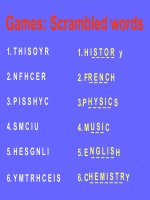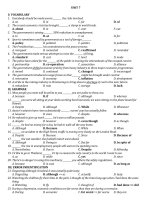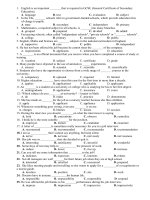REVISION (UNIT 9-16) - ENGLISH 12
Bạn đang xem bản rút gọn của tài liệu. Xem và tải ngay bản đầy đủ của tài liệu tại đây (127.18 KB, 3 trang )
Revision Test 2
(Units 9-16)
1. PRONUNCIATION
Choose the phrase that best completes each sentence.
1. He's is the contracted form of
...........................
A. He is B. He was C. He has D. either A or C
2. /
∫
il / is the phonemic script of
.............................
A. she'd B. she'll C. she will D. sheel
3. Linking occurs
..........................
in the phrase 'ten miles an hour'.
A. once B. twice C. three times D. four times
4. Elision doesn't occur in the phrase
............................
"
A. fast food B. next door C. put on D. can't come
5. The rhythm of the sentence 'Come for a drink' is
............................
A. OooO B. OoOo C. oOoO D. oOOo
6. Yes / No questions have a
..........................
tone.
A. rising B. falling
C. rising - falling D. falling - rising
7. A statement often has a
..........................
tone.
A. rising B. falling C. rising - falling D. falling - rising
8. A rising - falling tone is often applied to a
..........................
A. Yes / No question B. wh-question
C. question of choice D. statement
9. A wh-question usually has the same intonation as a
...........................
A. statement B. question of choice
C. Yes / No question D. tag-question
10. When a tag-question takes a rising tone, it is
.............................
A. an exclamation B. a surprise
C. not a real question D. a real question
11. VOCABULARY AND GRAMMAR
A. Choose the option that best completes each sentence.
11. In the past, women were confined to the home by social pressure
they were primarily expected to
......................
children.
A. bear and raise B. feed C. grow D. bring up
12. In the past, students would
.......................
books for solutions to their
questions.
A. look up B. look after C. look in D. look at
13. Many people say James
......................
his father, but I don't think they
are very similar.
A. looks after B. takes after C. likes D. looks alike
14.They lost their keys and had to break a window to
.........................
A. get in B. get out C. look in D. go in
15. Everybody in the company agreed that Henry was talented.
.....................
,
they didn't choose him as their manager.
A. Although B. However C. But D. Therefore
16. Today is holiday and these places of interest are open for free, so you
.................
;
... pay to get in.
A. mustn't B. mightn't C. shouldn't D. needn't
17. Oyster farming
......................
for many years in this part of the world.
A. has practised B. are practised
C. has been practised D. are practising
18. The more you practise,
...................
you can speak the language.
A. the more well B. the better C. more better D. the more
19. I'll let you know as soon as I
.......................
any news.
A. will get B. received
C. get D. am going to get
20. You must finish your work..
A. after B. before
B. Choose the underlined part which is grammatically incorrect and
needs to be changed to have a correct sentence.
21.
Things can't go off as they are ; something has to change.
22.
We will tell Joe to call you while we see him tomorrow.
23.
The plane eventually took after at 9:00 p.m. that night.
24.
The more difficult the task is, the more challenging is it.
25.
How can you read in this light? Let me turn off the big light for you.
C. Choose the sentence (A, B, C or D) that is closest in meaning to the
sentence in bold. Mark your choice on the answer sheet.
26. They awarded the little boy a prize for his bravery.
A. The little boy was awarded a prize for his bravery.
B. The little boy awarded a prize for his bravery.
C. A prize was awarded the little boy for his bravery.
D. A prize was awarded for his bravery to the little boy.
27. His alarm clock goes off every morning at six.
A. His alarm clock explodes every morning at six.
B. His alarm clock drops every morning at six.
C. His alarm clock rings every morning at six.
D. His alarm clock leaves every morning at six.
28. It took him a long time to recover from his illness.
A. It took him a long time to get out of his illness.
B. He didn't recover from his illness for a long time.
C. He was ill for a long time and didn't recover.
D. It took him a long time to get over his illness.
29. He arrived home and then had dinner immediately.
A. He had dinner as soon as he arrived home.
B. He had dinner when he arrived home.
C. He had dinner before he arrived home.
D. As soon as he had dinner, he arrived home.
30. Even though he had no money, he decided to go travelling. .
A. He had no money, so he decided to go travelling.
B. He had no money. However, he decided to go travelling.
C. He had no money, therefore he decided to go travelling.
D. He decided to go travelling but he had no money.
III. READING COMPREHENSION
A. Read the passage and choose the option that best completes eai
............
you can watch TV.
C. as soon as D. when
space.
The Wildlife Trade
The illegal wildlife trade involves billions of dollars each year (31) . It is
as serious as the drug or arms trade. It
(32).................... a number of species, including rhinos, elephants, tigers,
snakes, birds, and turtles. Many are endangered, which means the species will
vanish from the earth.
The animals, or their parts, are often used (33)……………trophies, special
foods, and exotic medicines. Many animals are (34)....................... their
natural homes. There are a few reasons. Jungles are shrinking
(35).................... the growth of cities and towns. Wild areas become more
(36)........................ The animals in the forests become easy targets for
poachers. The problem is made worse because many police officers do not
try to (37)..................... illegal hunting. They do not have enough staff to
deal with the issue. The greatest problem is demand. People from around
the world .still want these animals. They are happy to pay high
(38)....................for something special.
As long as people want to buy these products, poachers will hunt. Police
must stop poaching. Countries should make greater (39)....................... to
preserve jungles. Lastly, cultures must (40).......................... People should
believe that trade in wildlife is wrong.
1. A. worldwide
2. A. effects
3. A. like
4. A. missing
5. A.
because
6. A.
acceptable
7. A.
prevent
8. A.
money
9. A.
strive
10. A.
change
B. nationwide
B. affects
B. as
B. lacking
B. due to
B. available
B. preserve
B. values
B. efforts
B. remove
C. around world
C. reflects
C. for
C. decreasing
C. since
C. accessible
C. protect
C. salary
C. prices
C. vary
D. in world
D. reduces
D. by
D. losing
D. for
D. enjoyable
D. finish
D. prices
D. profits
D. differ
Read the passage and choose the best answers to the questions. Mark your
choice on the answer sheet.
During the nineteenth century, women in the United States organised and
participated in a large number of reform movements, including movements to
reorganise the prison system, improve education, ban the sale of alcohol, and most
importantly, to free the slaves. Some women saw similarities in the social status of
women and slaves. Women like Elizabeth Cady Stanton and Lucy Stone were
feminists and abolitionists who supported the rights of both women and blacks. A
number of abolitionists, including William Lloyd Garrison and Wendell Philips, also
supported the rights of women to speak and participate equally with men in
antislavery activities. Probably more than any other movement, abolitionism
offered women a previously denied entry into politics. They became involved
primarily in order to better their living conditions and the conditions of others.
When the Civil War ended in 1865, the Fourteenth and Fifteenth Amendments to the
Constitution adopted in 1868 and 1870 granted citizenship and suffrage to blacks but
not to women. Discouraged but resolved, feminists influenced more and more
women to demand the right to vote. In 1869 the Wyoming Territory had
yielded to demands by feminists, but eastern states resisted more stubbornly
than before. A women's suffrage bill had been presented to every Congress
since 1878 but it continually failed to pass until 1920, when the Nineteenth
Amendment granted women the right to vote.
Notes: - suffrage (n.) quyen bau cu
- stubbornly (adv.) mot cach ngoan co .
41. What did abolitionism offer women that other movements didn't?
A. entry to politics
B. participation in antislavery activities
C. the right to vote
D. better living conditions
42. According to the passage, why did women become active in politics?
A. To improve the conditions of life that existed at the time
B. To support Elizabeth Cady Stanton for president
C. To be elected to public office
D. To amend the Declaration of Independence
43. What had occurred shortly after the Civil War?
A. The Wyoming Territory was admitted to the Union.
B. A women's suffrage bill was introduced in Congress.
C. The eastern states resisted the end of the war.
D. Black people were granted the right to vote.
44. What does the Nineteenth Amendment guarantee?
A. Voting rights for blacks B. Citizenship for blacks
C. Voting rights for women D. Citizenship for women
45. When were women allowed to vote throughout the United States? A.
After 1866 B. After 1870
C. After 1878 D. After 1920
KEYS:
Revision Test 2
(Units 9-16)
I. PRONUNCIATION
A. l.D 2. B 3. B 4.C 5. A
B. 6. A 7. B 8. C 9. A 10. D
II. VOCABULARY AND GRAMMAR
A. 11. A 12. C 13. B 14. A 15. B 16. D 17. C 18. B 19. C 20. B
B. 21. A - go on 22. C - when 23. C - took off
24. D - it is 25. C - turn on C. 26. A
27. C 28. D 29. A 30. B
III. READING COMPREHENSION
A. 31. A 32. B 33. B 34. D 35. B 36. C 37. A 38. D 39. C 40. A
B. 41. A 42. A 43. D 44. C 45. D
Source: BAI TAP BO SUNG TIENG ANH 12, Hoang Thi Le,
MA, NHA XUAT BAN DHQG HA NOI









